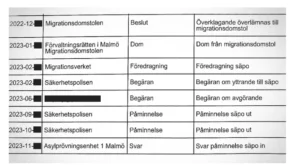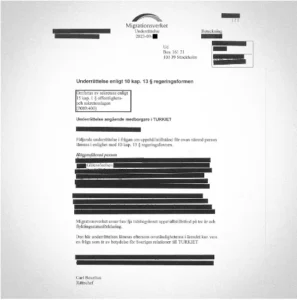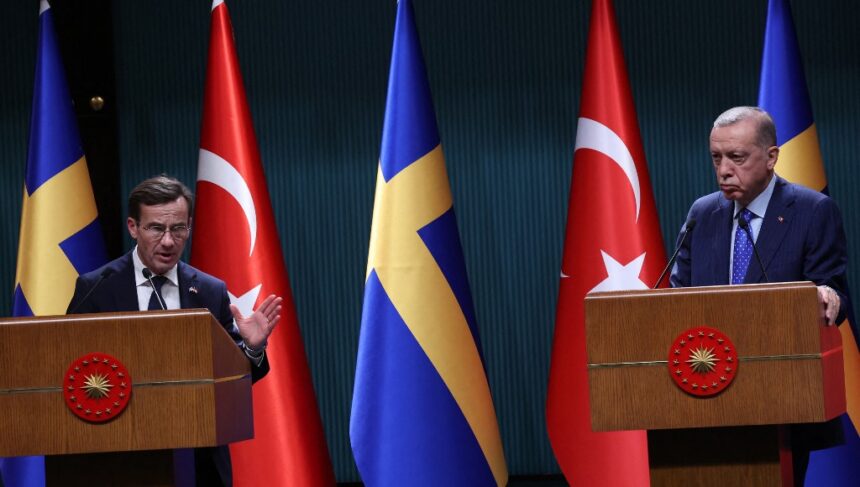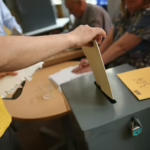The leaked documents obtained by Dagens ETC journalists reveal that Sweden has secretly changed its immigration procedures to either deny or delay granting asylum or residency to Turkish dissidents associated with the Gülen movement, which is based on religious beliefs. This was done in an effort to maintain diplomatic relations with Turkey., the Stockholm Center for Freedom reported, citing the Dagens ETC news website.

The documents reveal that the Swedish Migration Agency has been secretly transferring cases related to asylum seekers who are members of the movement to the Ministry of Foreign Affairs and the Swedish Security Service (Säpo). The reason for this is that dissidents and citizens who are not loyal to the government in Turkey could potentially harm Sweden’s new relationship with the regime of Turkish President Recep Tayyip Erdoğan. This policy change was part of Sweden’s efforts to secure NATO membership.
During the process of joining NATO, which required the unanimous approval of all the existing member states, Turkey put pressure on Sweden to ban organizations in the diaspora that criticize Erdogan and to extradite Turkish citizens who live in exile.
Ankara referred to these political exiles as “terrorists” who had taken refuge in Sweden. They were connected to the outlawed Kurdistan Workers’ Party (PKK) or the Gülen movement.
This pressure prompted Sweden to sign two agreements with Turkey in 2022 and 2023. In Madrid and Vilnius, respectively, Sweden agreed to present a “roadmap” for implementing counter-terrorism measures. Turkey, in turn, promised to send the Swedish accession protocol to its parliament for ratification.Sweden became a NATO member in March after nearly two years of trying to convince Turkey and Hungary to ratify the accession protocol.
The agreements outline long-term cooperation between the police and intelligence agencies of both countries in fighting terrorism, even after the ratification of NATO membership.
Although only the PKK has been designated as a terrorist organization by some parts of the international community, including the EU and the US, both the PKK and the Gulen movement are mentioned in the paragraphs of the agreements related to terrorism.
Since 2013, when corruption investigations implicated then-Prime Minister Erdogan, his family members and closest associates, Erdogan has been targeting the followers of the Gülen movement, which is inspired by the Muslim cleric Fethullah Gülen.
Erdoğan dismissed the investigations as a conspiracy by the Gülen movement against his government. He considered it a coup d’état orchestrated by Gülen and declared the movement a terrorist organization.Following a failed coup attempt in 2016, Erdoğan blamed Gülen for organizing it. However, Gülen and the movement strongly denied any involvement in the coup attempt or any kind of terrorist activity.
After the failed coup, the Turkish government declared a state of emergency and started a large-scale investigation of state institutions under the pretext of fighting against the coup.More than 130,000 civil servants, including 4,156 judges and prosecutors, were summarily dismissed from their positions due to being allegedly affiliated with or connected to “terrorist organizations.” This was done through emergency decrees that were not subject to judicial or parliamentary review. Additionally, 29,444 members of the armed forces were also dismissed in a similar manner.
In addition to the thousands who were imprisoned, many other followers of the Gülen movement had to leave Turkey to avoid the government’s crackdown. Most of these asylum seekers arrived in Europe through neighboring Greece.
Official EU asylum statistics show a significant increase in the number of applicants from Turkey after the failed coup. Turks are among the largest groups of asylum seekers, along with Syrians and Afghans.
One such person is Mehmet Aydoğmuş, a 35-year-old former journalist who lives in exile. He fled Turkey in 2016.Before that, Aydoğmuş worked as a news editor at a newspaper that was critical of the Erdogan regime in Turkey. During the coup attempt, he had a reporter on assignment who witnessed the movements of the soldiers involved in the coup. The reporter immediately reported the breaking news.
“The government used this to claim that we had known about the coup attempt beforehand. They banned our newspaper, and my name was among the first list of journalists they published, indicating that they were looking for us.”
Aydoğmuş has been facing trial in absentia since 2018. He is charged with four crimes and risks being sentenced to 15 years in prison, including membership in the Gülen movement.
Aydoğmuş had been granted refugee status and was living in Sweden with a temporary residence permit. In 2022, he applied for permanent residency, but his application was repeatedly delayed.
“I sent emails to my caseworkers at least a hundred times. They always told me the same thing — they were very busy,” he said.
After going through many hearings, he appealed his case to the Migration Court in early 2024. In the spring, he requested the Migration Agency’s documents related to his case.
He found notes that showed the Migration Agency had discussed his case with Säpo in a briefing in June 2023. He also got a classified letter sent to the Ministry of Foreign Affairs on November 9, 2023. The letter referred to paragraph 10.13 of the Swedish Constitution, which states that authorities must inform the government about matters that are important for relations with other countries.

In the letter, Carl Bexelius, the legal counsel of the Migration Agency, wrote that Aydoğmuş sympathizes with the Gülen movement and they are considering granting him a residence permit. However, Bexelius informed the Ministry of Foreign Affairs because “the circumstances of the case may be significant for Sweden’s relations with Turkey.”
The letter to the ministry also mentions that Turkey has prepared a request for his extradition and that President Erdoğan is the plaintiff in the legal case against Aydoğmuş.
His case was reviewed by the Swedish Security Service (Säpo) and then delayed at the Ministry of Foreign Affairs for several months. Eventually, in May 2024, he was granted a permanent residence permit.
Aydoğmuş said he was disappointed with the Swedish justice system. He explained, “I moved to Sweden because I thought I had finally found a country where I could live freely. But now I can’t trust the justice system anymore. The Migration Agency has acted as if they are following the government’s political agenda.”
“I understand how much NATO has affected Sweden. I believe the authorities decided to hold all our cases in abeyance to see where politics were headed. This has been the same story for my Turkish journalist friends in the past two years; they have not received any answers either.”
Aydoğmuş also mentioned that he does not feel safe in Sweden. He pointed out that in recent years, several Turkish journalists in exile, including Ahmet Dönmez and Abdullah Bozkurt, had been attacked on the street. “But I can’t do anything about it. I just try to stay vigilant,” he said.
Turkish opposition figures living in exile in Sweden, especially those on a list of political dissidents who the Turkish government wants to extradite, were targeted by a pro-government Turkish newspaper. The newspaper revealed their home addresses and published secretly taken photographs.In 2022, the Sabah daily published photos of three journalists based in Stockholm: Bülent Keneş, Abdullah Bozkurt, and Levent Kenez. President Erdoğan mentioned Keneş by name and requested his extradition from Sweden.
So far, the Supreme Court of Sweden has rejected all extradition requests. The court argued that the individuals in question have not committed any crimes under Swedish law and that there is a risk of torture and persecution for them in Turkey.
Lawyer Michel Moré has been representing refugees associated with the Gülen movement since 2016. He noticed a significant change in how the Migration Agency handles these cases after the NATO agreements were reached.
“This group is facing entirely new challenges when it comes to getting their cases approved. The way it used to work and the way it works now are like two different worlds,” Moré said.
“Previously, my clients were granted residence permits without the Security Police requesting a referral. Why are these people being noticed now?”
It is clear to Moré that the instructions have come from the government, not from the agency.
“I don’t think the Migration Agency came up with this on their own; it must have come from the government. The cases have been put on hold at the Ministry of Foreign Affairs and cannot move forward to a decision. It seems that they intentionally wanted to pause the cases. It’s also clear that this is related to the NATO process; nothing like this has happened before it started.”
According to Dagens ETC, the Migration Agency recently started asking asylum seekers who have connections to the Gülen movement very specific questions about their networks within the movement and their involvement with it while in exile.Applicants have been asked to tell about any connection with the movement in Sweden, especially with “high-profile individuals,” and have also been questioned about their involvement in Gülen-related organizations.These questions could indicate a systematic process of identifying such individuals, potentially influenced by Turkish intelligence agencies.
Michael Sahlin, a former Swedish ambassador to Turkey who now works as a Turkey analyst at the Swedish Institute of International Affairs, was surprised by how the Swedish authorities and the Ministry of Foreign Affairs have handled cases related to the Gülen movement.He said, “Calling the Gülen movement terrorists is important for the legitimacy of the Erdogan regime. However, from a Swedish perspective, we shouldn’t agree with this. We have no reason to be concerned about the Gülen movement from a security perspective.”
Sahlin also said: “We now accept responsibility for security in other member states in accordance with the Madrid and Vilnius agreements. However, these considerations should not conflict with our own values.”



